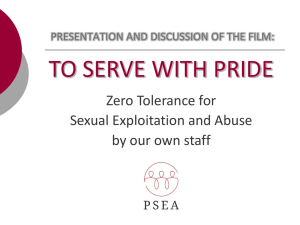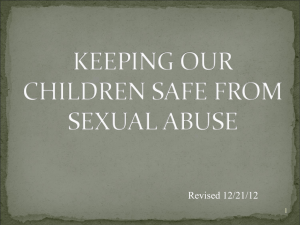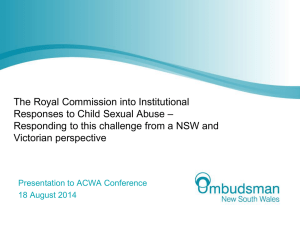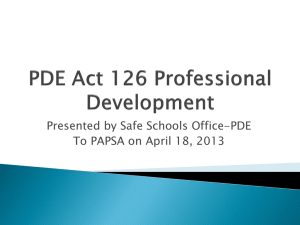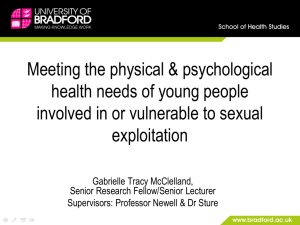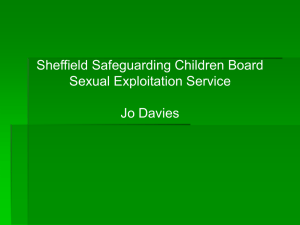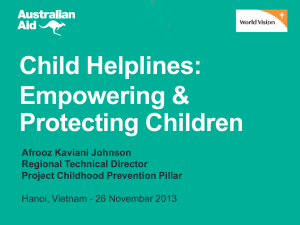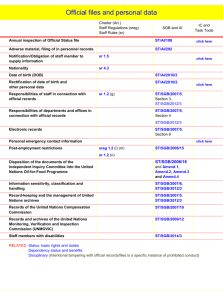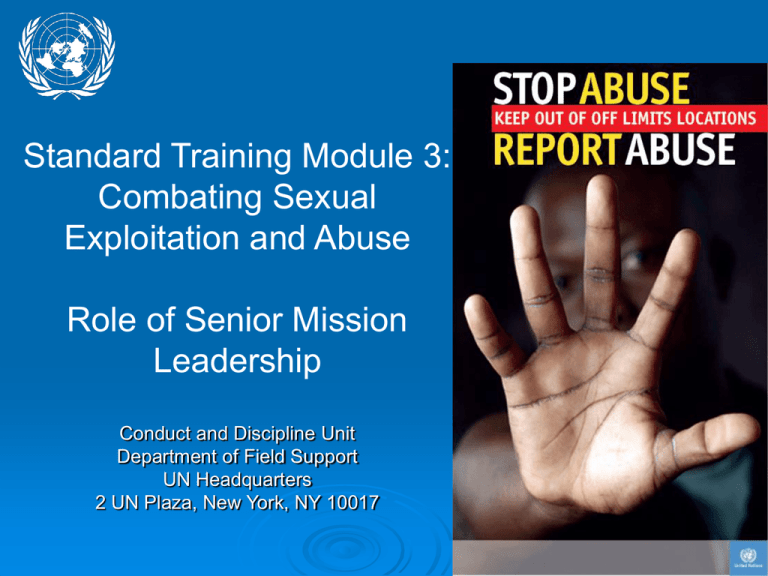
Standard Training Module 3:
Combating Sexual
Exploitation and Abuse
Role of Senior Mission
Leadership
Conduct and Discipline Unit
Department of Field Support
UN Headquarters
2 UN Plaza, New York, NY 10017
1
Contents of Module
1.
2.
3.
4.
5.
6.
7.
8.
9.
10.
11.
12.
13.
14.
15.
Learning Outcomes
Sexual Exploitation and Abuse: A Brief History
Standards of Conduct
Misconduct
Definitions of Sexual Exploitation and Abuse (SEA)
Specific Managerial Responsibilities
Environment in Post-conflict Societies and Impact on Host Population
Observances by UN Forces of International Humanitarian Law
Impact of Misconduct on Mission Mandate
Command Considerations
Three-pronged Approach
Leadership Best Practices
Leadership Challenge and Response
Unequivocal Message by Senior Leadership
Video and Case Study
2
Learning Outcomes
Provide
mission leaders with an
understanding of the problem related to
sexual exploitation and abuse;
Inform mission leaders of their
responsibilities and accountability with
respect to addressing serious misconduct;
Provide examples of best practice in the
field.
3
Sexual Exploitation and Abuse: A
Brief History
Allegations in Cambodia & Balkans – 1990s
Allegations in West Africa (Sierra Leone, Liberia)
2001-02 (A/57/465)
SG’s Bulletin - SGB 2003/13, 2003
Similar allegations in DRC 2004 (A/59/661)
Prince Zeid appointed adviser – 2004
Zeid Report submitted to C-34 – 2005
(A/59/710)
SG’s Report endorsed by GA – 2005
(A/Res/59/300)
Bunia II (A/61/841)
4
Standards of Conduct
Highest standards of efficiency, competence and
integrity
The UN has a zero-tolerance policy on sexual
exploitation and abuse
The UN holds accountable those throughout the
chain of command who fail to act decisively in
enforcing this standard
Managers, commanders and all other leaders
are accountable and responsible to their staff
5
Misconduct
Staff
Rule 110.1 defines misconduct as:
“Failure by a staff member to comply with
his or her obligations under the Charter of
the United Nations, the Staff Regulations
and Staff Rules or other relevant
administration issuances, or to observe
the standards of conduct expected of an
international civil servant…”
6
Guidelines and Prohibitions on SEA
as per ST/SGB/2003/13
Sexual
activity with children (persons
under the age of 18) is prohibited.
Exchange of money, employment, goods,
assistance or services for sex, e.g. sex
with prostitutes, is prohibited.
Sexual relationships with beneficiaries of
assistance are strongly discouraged.
7
Sexual Exploitation
Any actual or attempted abuse of a
position of vulnerability, differential power
or trust for sexual purposes, including but
not limited to, profiting monetarily, socially
or politically from the sexual exploitation of
another.
(ST/SGB/2003/13)
8
Sexual Abuse
Actual or threatened physical intrusion of a
sexual nature, whether by force or under
unequal or coercive conditions.
(ST/SGB/2003/13)
9
Specific Managerial
Responsibilities
ST/SGB/2003/13
Create and maintain an environment that prevents SEA,
and shall take appropriate measures for this purpose.
Inform staff of the contents of the SGB and ascertain that
staff receive a copy.
Take appropriate action in cases where there is reason
to believe that any of the standards have been violated.
Inform the Department of Management of its
investigations into cases of SEA, and the actions it has
taken as a result of such investigations.
Ensure all serious misconduct is reported to OIOS.
10
Environment in
Post-conflict Societies
Women
and children most vulnerable
Sexual violence as strategy in armed
conflict
Increase of organized crime
Increased poverty
Loss of social services
Loss of access to rights; fear of retaliation
and lack of access to justice
11
Impact of SEA on
Host Population
Further
victimization of
vulnerable persons
Increased
risks of sexually
transmitted infections
Violates
victims’ human
rights
12
Observance by UN Forces of
International Humanitarian Law
ST/SGB/1999/13
The SGB applies to UN forces in situations of armed
conflict or in peacekeeping operations where force is
permitted in self-defence.
Military personnel are subject to prosecution in their
national courts.
Attacks against the civilian population are prohibited
Women shall be protected against any attack, in
particular against rape, enforced prostitution.
Children shall also be protected against any form of
indecent assault.
13
Impact of Misconduct on
Mission Mandate
Misconduct
contrary to UN Principles
Violates Integrity and impartiality
Reduces credibility and image of UN
Threatens UN security
Undermines rule of law & fosters crime
14
Command Considerations
Sexual
exploitation & abuse does not
occur in a vacuum
Abuse & other misconduct prevail in
environments of ineffective leadership
Leaders are accountable for their own
failures and of those they lead
15
DPKO’s Three-pronged
Approach
The comprehensive strategy is a three-pronged
approach based on the recommendations of the
Special Committee on Peacekeeping Operations
(A/59/19/Rev.1) adopted in General Assembly
resolution 59/300.
Prevention
Enforcement
Remedial action
16
Three-pronged Approach:
Prevention
Uniform
Standards
Training
Public
outreach information/outreach
Welfare & Recreation
17
Three-pronged Approach:
Enforcement
Complaint
mechanisms/reporting
Investigations
Data management
18
Three-pronged Approach:
Remedial Action
Victim Assistance
Reputation
Repair
19
Leadership Best Practices
Continuous training for all levels of personnel
Periodic misconduct risk assessments
Address potential or actual violations
Thorough investigation & vigorous enforcement
Public outreach/awareness of UN measures
Establish and maintain reporting mechanisms
Implement welfare and recreation measures
Create and maintain an environment free from
sexual exploitation and abuse
Raise awareness of prohibited conduct
20
Leadership Challenge
and Response
Challenge: UN Proximity to local living areas
Responses:
Move barracks away from densely populated areas
Improve lighting around barracks & entry/exit controls
Check for holes in fence
Co-operate with local police,
UN security to minimise access
to barracks by local population
Organise hearts and minds projects
e.g. school rehabilitation that allow structured and
supervised contact with the public.
21
Leadership Challenge
and Response
Challenge: Fraternization or inappropriate
contact with local population
Responses:
Non-fraternization for contingent
members
Curfews & patrols to monitor personnel
Off-Limits premises/locations
Wearing of uniform when in public
Enforce Disciplinary Directives
Welfare & recreation facilities
Enforce Commanders accountability
22
Unequivocal Message
by Senior Leadership
Maintain standards of conduct
Commitment to SG’s zero-tolerance policy
Emphasize command responsibilities
Set the tone – be a role model
Report misconduct
23
Video & Case Study
Code of Conduct Video
Case study
Reading,
discussion, identification of
issues
Group
presentation of leadership response
24
We create
the demand
We are part
of the
problem
25

